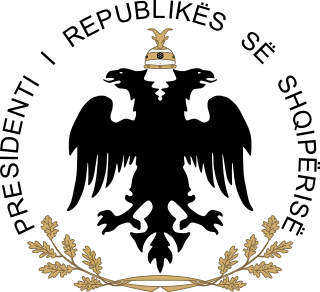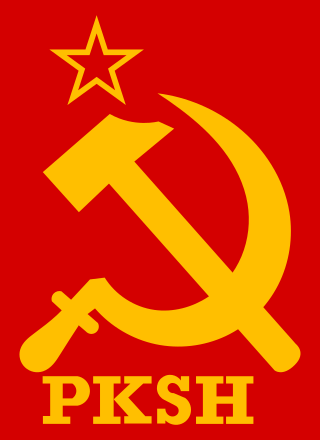Albania is a unitary parliamentary constitutional republic, in which the president of Albania is the head of state and the prime minister of Albania is the head of government in a multi-party system. The executive power is exercised by the Government and the prime minister with its Cabinet. Legislative power is vested in the Parliament of Albania. The judiciary is independent of the executive and the legislature. The political system of Albania is laid out in the 1998 constitution. The Parliament adopted the current constitution on 28 November 1998. Historically Albania has had many constitutions. Initially constituted as a monarchy in 1913, Albania became briefly a republic in 1925, and then a authoritarian monarchy in 1928. In 1939 Albania was invaded by Fascist Italian forces, imposing a puppet state, and later occupied by Nazi German forces. Following the partisan liberation from the Nazis in 1944 a provisional government was formed, which by 1946 had transformed into a communist one-party state. In March 1991 democracy was restored with multi-party elections.

The prime minister of Albania, officially the prime minister of the Republic of Albania, is the head of government of Albania. The office of the prime minister is a core institution in the politics of Albania formed after the Albanian declaration of independence on 28 November 1912. Since that time, the nation has navigated a dynamic political evolution spanning distinct periods, encompassing a monarchy, a communist regime and the eventual democratic order. In 1912, Ismail Qemali was inaugurated as the first prime minister of Albania, guiding the nation toward sovereignty amidst the complex conditions in the Balkans. In 1944, Enver Hoxha implemented a radical change in government, transforming Albania into an authoritarian and isolationist communist regime. In 1991, the nation transitioned into a democracy that marked a notable shift, when Fatos Nano emerged as the first post-communist prime minister of Albania.

The president of Albania, officially styled the President of the Republic of Albania, is the head of state, commander-in-chief of the military and the representative of the unity of the Albanian people.

The Socialist Party of Albania is a social-democratic political party in Albania. It has been described as centre-left. It was founded on 13 June 1991. The PS is an associate of the Party of European Socialists and a member of the Socialist International, and holds pro-European views.
The Democratic Alliance Party is a liberal political party in Albania. The party was formed in 1992 by Neritan Ceka and other dissidents of the Democratic Party of Albania. They opposed the leadership of the party's leader Sali Berisha.

The Social Democratic Party of Albania is a minor social-democratic political party in Albania. Its founder is Skënder Gjinushi, a former Minister of Education (1987–1991) and Speaker of Parliament (1997–2001).

The Republican Party of Albania is a national-conservative political party in Albania. It currently holds 3 of the 140 seats in the Parliament of Albania, in alliance with the Democratic Party of Albania.

Open list describes any variant of party-list proportional representation where voters have at least some influence on the order in which a party's candidates are elected. This is as opposed to closed list, in which party lists are in a predetermined, fixed order by the time of the election and gives the general voter no influence at all on the position of the candidates placed on the party list.
Regular elections in Albania are mandated by the Constitution and legislation enacted by Parliament. The Parliament (Kuvendi) has 140 members elected for four-year terms. The electoral system is open list proportional representation. There are 12 multi-member constituencies corresponding to the country's 12 administrative regions. Within any constituency, parties must meet a threshold of 3 percent of votes, and pre-election coalitions must meet a threshold of 5 percent of votes.
Communist Party of Albania 8 November is a political party in Albania. It is led by Preng Çuni.

The Communist Party of Albania is an anti-revisionist Marxist–Leninist communist party in Albania. The party was formed in 1991, as a split from the Party of Labour of Albania which converted itself into the Socialist Party of Albania. It upholds Enver Hoxha and Hoxhaism. The party was led by Hysni Milloshi until his death in 2012.
The Social Democracy Party of Albania is a social-democratic Albanian political party. It was established in 2003. In the July 2005 elections it won two seats in Parliament. Its leader is Paskal Milo.

Lëvizja Vetëvendosje (LVV) is a left-leaning social democratic political party in Kosovo. It is a member of the Progressive Alliance, and an observer in the Party of European Socialists, and the Socialist International.

The Constitutional Court of Kosovo is the final authority for the interpretation of the Constitution of Kosovo and judicial review of laws for compliance with the constitution. The Constitutional Court is located in Pristina, the capital of Kosovo. The Constitutional Court was established shortly after Kosovo's independence and heard its first cases in 2009.
Indirect presidential elections were held in Albania on 30 May, 4, 8 and 11 June 2012, the seventh such elections since the collapse of the communist regime in 1991. The first through third rounds of voting were inconclusive. The fourth round resulted in the incumbent party's member Bujar Nishani being elected as President.
The 2022 Albanian presidential election marked the ninth presidential election held in Albania, taking place from 10 May to 4 June 2022. The election process commenced with the nomination of candidates by the parliament of Albania, necessitating a total of four rounds of voting. The initial three rounds of voting, held on 16, 23, and 30 May, did not result in the election of a president due to an insufficient number of candidates, largely attributed to the internal leadership crisis of the Democratic Party (PD) and the disagreements among the governing parties. On 3 June, the Socialist Party (PS) nominated Bajram Begaj, who was subsequently elected in the fourth round on 4 June.
The Christian Democratic Party of Albania is a small Christian democratic political party in Albania.

The Twenty-ninth Legislature of Albania, officially known as the VIII Pluralist Legislature of Albania, is the legislature of Albania following the 2013 general election of Members of Parliament (MPs) to the Albanian Parliament. The party of the Prime Minister Edi Rama, PS, with its coalition partners obtained an absolute majority of 83.

Bajram Begaj is an Albanian politician and military officer who is the incumbent president of Albania since July 2022. Having had a long career in the Albanian army, he served as the 26th Chief of General Staff of the Albanian Armed Forces from July 2020 to June 2022. Politically independent, on 3 June 2022, Begaj was officially nominated by the governing Socialist Party as the candidate to the fourth round of the 2022 presidential election.
Parliamentary elections are scheduled to be held in Albania by June 2025.











